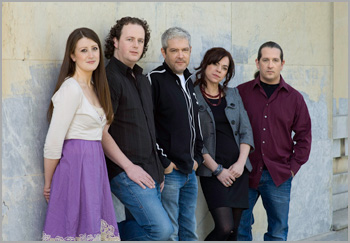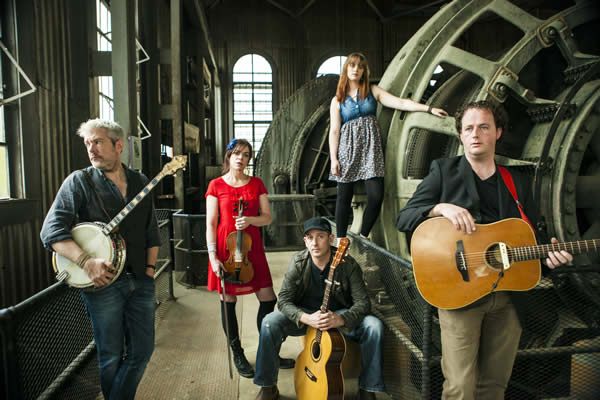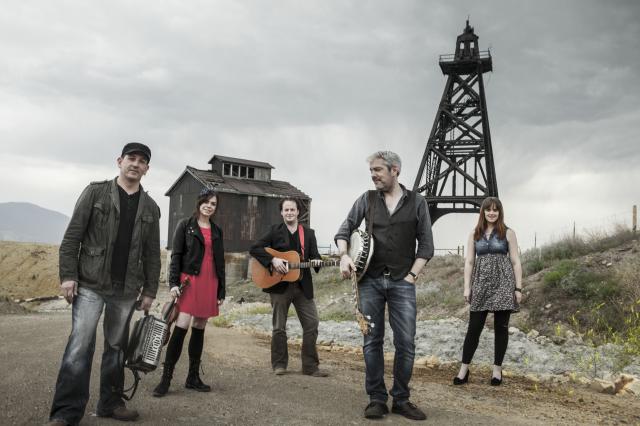| T O P I C R E V I E W |
| lemonade kid |
Posted - 22/05/2013 : 17:27:30
Solas (Gaelic for "light")
Solas, "Irish America's most influential band" (NPR's The Thistle and Shamrock)
Ghost Of Tom Joad
https://www.youtube.com/watch?v=rGzEToTFouU

Solas is an Irish-American musical group formed in 1994, playing Irish traditional music as well as original compositions, sometimes demonstrating an inclination towards Country music in recent albums.
Their name comes from an Irish word meaning "light". At the time, the band was made up of Séamus Egan, who had already recorded two solo albums as well as a soundtrack to a film; Winifred Horan, a member of Cherish the Ladies; John Doyle, previously a member of Susan McKeown & The Chanting House with Egan; Karan Casey and John Williams.[1] Their first performance was in Georgetown University's Gaston Hall in Washington, D.C. in 1995.
Solas received national exposure on American Public Media's A Prairie Home Companion in May 1996. That same year, they recorded their first album and, in October, toured the U.S. A second album followed in 1997 and several members of Solas appeared on Karan's debut solo album as session musicians. Following their second album, John Williams left Solas to pursue a solo career to be replaced by Mick McAuley. In 1999, between the releases of The Words That Remain and The Hour Before Dawn, Karan left for a similar purpose and was replaced by Deirdre Scanlan. John Doyle left after the release of The Hour Before Dawn, being replaced by Donal Clancy. Clancy left after the release of The Edge of Silence, and was replaced by Éamon McElholm. In June 2008 the band announced Mairéad Phelan had joined the group as their new singer. In September 2010, Niamh Varian-Barry from Cork replaced Mairead Phelan as lead singer of Solas.
Discography
* 1996 — Solas
* 1997 — Sunny Spells and Scattered Showers
* 1998 — The Words That Remain
* 2000 — The Hour Before Dawn
* 2002 — The Edge of Silence
* 2003 — Another Day
* 2005 — Waiting for an Echo
* 2006 — Reunion: A Decade of Solas
* 2008 — For Love and Laughter
* 2010 — The Turning Tide
* 2013 — Shamrock City

Solas: America's Own Irish-Music Band
BY EARLE HITCHNER-Celtic Cafe
Vienna, VA
Forming a patchwork of parkas, slickers, and umbrellas, the capacity crowd sat and stood in a pelting chill rain to catch one of the most exciting Irish traditional bands to emerge in many years, Solas, who were performing in an open-air theater on the spacious grounds of Wolf Trap Farm Park. This brilliant acoustic quintet was the headlining act at the 20th annual Washington, D.C., Irish Folk Festival sponsored by the private, not-for-profit National Council for the Traditional Arts, the nation's oldest organization for presenting folk and ethnic culture. The concert by Solas (Gaelic for "light") was so rousing that the audience cheered and clapped for more in the merciless downpour at the end.
This surprised no one, however, for in the year and a half they've been together, Solas has electrified crowds everywhere they've performed. Combining great virtuosity and versatility, they already seem poised to join the elite of Irish traditional bands active today, including the Chieftains and Altan. But unlike those groups, Solas originates not in Ireland but in the United States and features three Irish Americans: button accordion-concertina player John Williams, fiddler Winifred Horan, and multi-instrumentalist Séamus Egan. The other two members, vocalist Karan Casey* and guitarist John Doyle, are both Irish transplants to New York City. Recently released by Shanachie Records, the self-titled debut album by this homegrown group fully confirms the promise of their stage performances.
Their imaginatively arranged medleys of Irish dance tunes are tight, polished, and propulsive, while the singing of lead vocalist Karan Casey, blessed with a two-and-a-half-octave range, is as clear and beautiful as the famous hand-cut crystal from her home county of Waterford. Even without the media entrée of this stunning first recording, Solas has already appeared on two very popular Public Radio International programs, "Mountain Stage" and Garrison Keillor's "A Prairie Home Companion." They will also be sharing the evening concert stage with Grammy-winning bluegrass sensation Alison Krauss and the 1994 National Heritage Fellowship-winning gospel group the Five Blind Boys of Alabama at the fourth annual American Roots Fourth of July Celebration that will be broadcast live at night over National Public Radio from the National Mall in Washington, D.C.
Remarkably, all these bookings for Solas came strictly from strong word of mouth. "I've waited a long time for a band like this to come along," said John Williams, a five-time All-Ireland champion living near Chicago, to which his father had emigrated 39 years ago from the tiny fishing village of Doolin, West Clare. In 1989, John became the only American ever to win the coveted All-Ireland senior concertina title.
"All of us, I think, were looking for a way to express what we've learned in the Irish tradition and put our own collective stamp on it. John Doyle's guitar, for example, gives us a big bottom end without veering into a rock-and-roll idiom. It's something we can build on, and I often play rhythm on the accordion to flesh out what he does." From Dublin, Doyle came to New York City at the beginning of the decade, playing first in Chanting House, an Irish duo that for a time expanded into a quartet featuring Séamus Egan. Since then, Doyle and Egan have often performed and recorded together, including on Egan's latest Shanachie solo release, "When Juniper Sleeps."
Doyle's hard-driving style of guitar picking in Solas is counterbalanced by a more lyrical side of his talent, evident in the acoustic-guitar "effects" he so nimbly plucks and sustains to accompany slow airs and many of Casey's traditional songs. Irish traditional singing was not always the primary pursuit of Karan Casey, who in the late 1980s began as a music major at University College Dublin and also studied classical piano at the Royal Irish Academy of Music.
"At the end of my first year at UCD," she recalled, "there was a concert at which I sang a jazz song. I was told afterward by the head of the music department that that wasn't music. It was one of the reasons I left the music department: they were too narrow-minded." The strong-willed Casey still loves jazz, especially the scat singing of the late Ella Fitzgerald, and formally studied it after she had emigrated to New York in May 1993. "I used to sing jazz at a friend's house on Friday nights," she said, "but then I started to go to traditional sessions [informal jams of Irish music] around the city because I was really lonely. That's how I got back into traditional singing again. I think jazz musicians have the same kind of history as Irish traditional musicians in a way--this incredible skill that too often is overlooked or dismissed by the public."
Winifred Horan has performance skills just as impressive as Casey's. One of the most accomplished Irish stepdancers New York City has ever produced, with nine North American titles to her credit, Horan took early lessons in Irish fiddling and won an All-Ireland junior championship at age 11. Then she switched to classical music. For 15 years she devoted herself to it, winning scholarships to the Mannes College of Music in Manhattan and later the New England Conservatory of Music in Boston. There she performed with a number of string quartets and orchestras, including the Boston Pops. But Horan returned to her first love, Irish traditional music and dance, not long after she returned to New York in 1990. Initially she was asked to stepdance with Cherish the Ladies, an ensemble featuring many of the best Irish American women performers today, and later she played fiddle with them. After four years in Cherish the Ladies, Horan left to form Solas, and she now also plays with the band headed by button accordionist Sharon Shannon out of Ireland.
"When I got back into Irish traditional music," explained Horan, "I was completely amazed at how big the repertoire is, even bigger than in classical music. I feel I've missed 15 years of sessions, but by the same token I wouldn't turn back time and change the way I learned or the approach I took. Classical music has given me the training, the tools, the discipline, while Irish music has rekindled the sheer love of playing again. I want to bring all of that to Solas." What Séamus Egan brings to Solas is no fewer than eight instruments: flute, tin whistle, low whistle, nylon-string guitar, four-string banjo, mandolin, bodhrán (a hand-held frame drum), and uilleann pipes.
Also in demand for movie soundtracks--his playing can be heard in both "The Brothers McMullen" and the Academy Award-winning "Dead Man Walking �--Egan alone offers a versatility that ensures Solas's sound will be varied, spirited, and refreshingly risk-taking.
"He's an unbelievably quick learner with impeccable instincts," affirms Limerick-born musician and ethnomusicologist Mick Moloney, his mentor, friend, and frequent playing partner. "I think it took hundreds of years of Irish music in America to produce somebody like Séamus Egan."
The same might now be said of Solas. Made in America, it's an Irish traditional band bearing all the marks of greatness.
The Solas article by Earle Hitchner originally appeared in the June 20, 1996, issue of The Wall Street Journal.
Pastures Of Pleanty
https://www.youtube.com/watch?v=X3C1WRIitR8
Darkness Darkness
https://www.youtube.com/watch?v=Erj8Nz_lwN8

________________________________________________
Old hippies never die, they just ramble on.
-lk |
|
|


